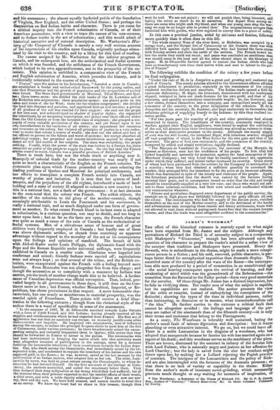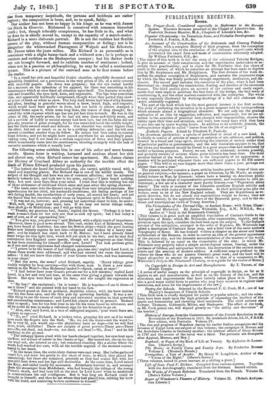JAMES'S WOODMAN. * Tux effect of this historical romance is scarcely
equal to what might have been expected from Mr. James and the subject. Although any portraiture of Richard the Third is of necessity subject to a comparison with Shakspere's " Gloucester," enough has been advanced upon the question of his character to prepare the reader's mind for a softer view of the usurper than tradition and Shakspere have presented. Henry the Seventh, who is subordinate in the drama, might be made a more conspi- cuous person in a fiction ; and his cold, reserved, politic character, is per- haps better fitted for metaphysical exposition than dramatic display. The unsettled state of the country after the wars of the Roses—the unscrupu- lous able men produced by a period of commotion in an uncultivated age —the social heaving consequent upon the revival of learning, and that awakening of mind which was the groundwork of the Reformation—the transition from the Baronial to the Tudor period—form very good materials for the novelist. Of these things Mr. James has a distinct impression, but he fails in vivifying them. The reader sees of what the subject is capable, but its capabilities are not realized. The author presents the view of the critic or essayist, instead of emboydying the conceptions of the fictionist ; showing the types of the time in individual persons, rather than insinuating, in discourse or in masses, what transcendentalists call " the idea." He further carries to the extreme a critical fault that cannot be altogether avoided : the feelings and language of the per- sons are rather of the nineteenth than of the fifteenth century—it is only their terms and costumes that belong to the Plantagenets. As a story, The Woodman is tolerably well sustained, bating the author's usual fault of minute digression and description : but it wants absorbing or even attractive interest. We go on, but we could leave off. There is a noble Lancastrian in the disguise of a woodman, who lira adopted that masquerade because he fancies his wife has married again on a report of his death ; and this woodman serves as the machinery of the piece. There are lovers, distressed by the contract in infancy of the heroine Iola with Lord Fulmer, who is naturally angry and jealous at her affection for Lord Chartley; but the lady is saved from the slur her conduct might throw upon her, by making her a Lollard rejecting the Popish practice of contract. The intrigues of the Lancastrians and the policy of Rich- ard are also intermingled with the fortunes of the dramatis personae; so that there is no lack of variety or capability in the theme. Either from the author's mode of incessant novel-grinding, which necessarily prevents much thought or any waiting for moments of inspiration, or • The Woodman; a Romance of the Timm of Etchard III. By G. P. B. Jam*. Esq., Author of Darnley," " Henry Dastuton," &c. In three volumes. Published. by Newby. else from temporary ineptitude, the persons and incidents are rather jogtrot ; the composition is loose, and, so to speak, flabby. Our author has not been so happy in his kings as he was with James the Sixth in Gonnie. Richmond is conceived with common historical truth ; but, though tolerably conspicuous, he has little to do, and what he does he is chiefly moved to, except in the capacity of a match-maker. Richard is a more elaborate portrait. He is not the ruthless but flexible person of the play, without human compunction or feeling; nor is he altogether the whitewashed Plantagenet of Walpole and his followers. Mr. James takes the juste milieu. His Richard is as personable as is consistent with a slight hump-back and a withered arm ; he is perhaps as resolute and ruthless as the Sbaksperian usurper ; but his darker deeds are not brought forward, and he exhibits touches of sentiment : indeed, when not in a passion or philosophizing, he may he called a sentimental tyrant. This is a picture of the outward man as he first comes before the reader.
" In a small but rich and beautiful Gothic chamber, splendidly decorated and splendidly furnished, sat a gentleman in the very prime of life, at a table covered with manifold papers. His dress was gorgeous ; but the eye rested hardly for a moment on the splendour of hie apparel, for there was something in his countenance which at once fixed all attention upon itself. The features were deli- cate and beautiful, the eyes dark, keen, and expressive. The lips were somewhat thin, and apparently habitually compressed, though when they'parted they show- ed a row of teeth as white as snow. The long dark brown hair was of silky fineness and gloss, bending in graceful waves about a brow, broad, high, and majestic, which would have been perfect in form, had not habit or nature stamped a wrinkled frown upon it, while some long lines, the traces of deep thought, fur- rowed the wide expanse which age has not yet had time to touch. He was in the prime of life, the early prime, for he had not seen three-and-thirty years, and not a particle of bodily or mental energy had been lost; but yet his form did not give any promise of great strength, fur he was somewhat below the middle height, and the limbs seemed small and delicate. One shoulder was rather higher than the other, but not so much so as to be a striking deformity; and the left arm seemed somewhat smaller than its fellow. No means had been taken to conceal these defects ; and yet he might have passed anywhere for an exceedingly good- looking man, had it not been for a certain expression of fierce and fiery passion which occasionally came into his countenance, blending strangely with the look of sarcastic acuteness which it usually bore."
The following scene exhibits him in one of his softer and more human moods. Queen Anne is waiting, harassed and anxious about her sick and absent son, when Richard enters her apartment. Mr. James claims the History of Croyland Abbey as authority for the terrible effect the death of Prince Edward produced upon his parents. "The instant she heard her husband's step, she turned quickly round with a timid and inquiring glance. But Richard was in one of his milder moods. The subject of his thought and hers was one of common affection; and he advanced tenderly towards her, and took her in his arms, saying—' I have heard nothing, Ann; but cast these fears from your mind. I trust that this is nothing but one of those sicknesses of childhood which come and pass away like spring showers.'
" The tears came into the Queen's eyes, rising from very mingled emotions. Her apprehension for her child, her husband's tenderness, the feeling perhaps of her own failing health, the recollections of early years, all moved her heart; and yet she feared that her emotions might rouse an impatient spirit in Richard's breast.
" It was not so, however; and, pressing her somewhat closer to him, he mid- ' Well, well, wipe away your tears, love. If we hear not better tidings today, thou shalt go to Middicham; and I will go with thee.'
Thanks, my gracious lord, thanks,' replied the Queen. Perhaps it is bat a weak woman's fears for her only one that so sink my spirit; but I feel today a aert of awe, as if of approaching fate.'
"'You give way, you give way !' said Richard, with a slight touch of impatience. `However, there is gaud news abroad. This rash, exiled Earl of Richmond, whom you have heard of doubtless, has seen his Breton ships—which the good chatting
Duke now bitterly regrets he lent him—dispersed and broken by a heavy tem- pest; and he himself has slunk back to St. Melees; but I have already limed
some twigs for this light bird, which will yet stick to his feet; and he may find conveyance into England more speedy, though not so prosperous as that which he has been contriving for himself.—How now, Level? You look perilous grim, as if you and your cognizance had changed countenances.' "` I grieve to be the bearer of bad tidings, gracious sire,' replied Lord Level, to whom these words were addressed, and who had entered the room the moment before: ' I did not know that either of your Graces were here, and was hastening to your closet.'
But the news, the news!' cried Richard, eagerly. 'Heavy tidings grow doubly weighty by long carrying—Out with them, man. Is there a new insur- rection in the West P—Has Richmond landed P—Spcek, speak at once!' "' I bad better have your Grace's private ear for a few minutes,' replied Lord Level, in a low and very sad tone, at the same time giving a glance towards the Queen. Her eyes were fixed upon his face; and she caught the expression at once.
" 'My boy!' ebe exclaimed ; he is worse He is hopeless—I see it there—I see it therel' and she pointed with her hand to his face.
"Richard gazed at him in profound, deathlike silence, with his brow knitted over his fine keen eyes, and the thin pale lip quivering fearfully. It was a ter-
rible thing to see the traces of such deep and unwonted emotion on that powerful and commanding countenance; and Level felt almost afraid to proceed. Richard tried to speak ; but for the first time in his life his voice found no utterance, and all he could do was to make a vehement sign for his favourite to go on.
" Alas, sire,' said Lovel, in a tone of unfeigned anguish, your worst fears are, I grieve to say— "No, no! cried Richard, in a broken voice, grasping his arm as if he would have sunk the fingers into the flesh. ' No, no, not the worst—not the worst !—
He is very ill, you would say—the physicians have no hope—but we will find more, wiser, skilfuller I There are simples of great power—There are—There ate—No, not dead, not dead—no, not dead, not dead I—Oh, Jean!' and he fell headlong to the ground. " The unhappy Queen stood with her hands clasped together, her eyes bent upon the floor, not a trace of colour in her cheeks or lips. She moved not, she spoke not,
she wept not, she uttered no cry; but remained standing like a statue where the words had reached her ears, with all the terrible anguish of the moment concen- trated in her heart.
" In the mean time, the embroidery-frames were cast away. Her ladies gathered round her, and drew her gently to her chair of state, in which they placed her unresisting; but there she remained, precisely as they had seated her, with her eyes still bent down and her lips still motionless. At the same time, Lovel raised the King, and called loudly for assistance. Attendants hurried in, and amongst them the messenger from Middleham, who had brought the tidings of the young Prince's death, and had been left at the door by Lord Level when he undertook to communicate the sad intelligence. But it was long ere Richard could be brought to himself; and then he sat where theyhad placed him, rubbing his brow With his hand, and muttering broken sentences to himself."

























 Previous page
Previous page